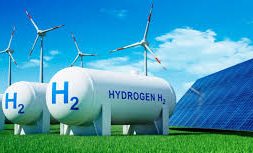
Solar Is One Bank’s Answer to Nigerian Electricity Blackouts
The manager of Nigeria’s biggest pension fund is teeing up millions in financing for the renewables sector but it’s also embracing solar energy for the good of its own business.
Standard Bank Group Ltd.’s Nigerian unit is aiming to run nearly half its offices on solar by 2022 to cut down on energy costs and dependence on diesel-powered generators in the West African nation, which suffers from acute power shortages and frequent blackouts.
Stanbic IBTC Holdings Plc’s shift to solar-powered systems will enable it to cut diesel costs for generators by about 20%, Omolola Fashesin, its head of sustainability, said in an emailed response to questions.
The fuel makes up a significant portion of spending on its banking premises that accounted for about 6.3% of its operating expenses — excluding staff costs — in 2020.
The bank has 175 business offices in Africa’s largest economy, all of which have to be supported by diesel-powered generators.
Stanbic IBTC also plans to set aside $100 million for lending to local companies in the renewables sector over the next three years to help boost adoption of cleaner forms of energy, according to Fashesin.
“The prospects for solar companies in Nigeria are good but it does require a significant amount of capital,” she said. “There are opportunities for banks to partner with these companies to provide lending.”
Energy Goals
Stanbic IBTC’s parent, Africa’s largest bank by assets, agreed this month to set targets for reducing its exposure to fossil fuels after initially rejecting a demand from a group of fund managers to include a resolution on climate-change goals at its May 27 annual general meeting.
The greenhouse gas emissions associated with financial institutions’ investing, lending and underwriting activities are more than 700 times higher, on average, than their direct emissions, according to a report published in April by climate nonprofit CDP.
Lenders and businesses in Africa’s largest economy routinely run generators for their offices because of the unreliability of power supply from the national grid, which provides only about 4,500 megawatts of electricity for more than 200 million people.
Stanbic IBTC is in talks with development financial institutions including the International Finance Corp. and the U.S. International Development Finance Corp. for on-lending facilities to Nigerian firms investing in renewables, Fashesin said. It plans to finalize credit for two renewable transactions totaling $40 million, this year, she said.
Nigeria has pledged to cut carbon emissions 20% by 2030 under the Paris Climate Agreement as part of an effort to overcome its energy challenges.
While the government is encouraging private sector investments in renewables, it’s also injecting 10% of the 2.3 trillion naira ($5.6 billion) intended to spur a recovery from the coronavirus pandemic toward providing solar power for households.














